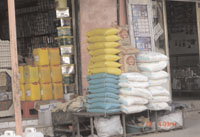
Price increases: More burden upon citizens [Archives:2006/979/Reportage]
August 7 2006
 |
Yemeni markets these days have witnessed a rapid increase of primary commodities without any justification. Price increases not only involve imported commodities like sugar, flour, wheat and consumer goods, but also include Yemeni-produced commodities such as soup, oils, ghee, milk, juice, mineral water and sweets. Thus, Yemeni citizen are compelled to accept these price hikes and adapt themselves to such new developments.
The Yemeni government previously warned merchants who are increasing and playing with prices in an Aug. 18 statement by Yemeni Prime Minister Abdulqader Bajammal during a joint Parliament-Cabinet session.
“These unjustified price increases express the greediness of some merchants who look out for their own interests at the risk of the public's interest,” Bajammal stated, “It's a risky thing when the private sector puts itself in this situation because it will incur citizens' anger and indignation.”
Recent days have witnessed several meetings involving the government, represented by the Ministry of Trade and Industry, and representatives of official parties in public unions, such as chambers of commerce, the agricultural and fish cooperative council and the exporters' society, which approved that prices should remain as they were before the latest price hikes.
However, such official initiatives have been futile because prices still are increasing. “Over the past few days, commodity prices have witnessed increases one after another. Distributors now are offering their goods at 10 percent higher pricing,” supermarket owner Ali Al-Tawili explained.
Most citizens are dissatisfied with the latest prices, considering them unjustified. “Price increases aren't justifiable because there's no reason for such an increase. It's a ploy by big businessmen and producers to exploit the current situation and play with prices,” Yahya Maudhah asserted.
“There should be a transparency in the market. The government should abide by its announcement regarding partnership with the private sector and the latter should respect its promises in this respect. Trade should be far removed from politics because citizens are the ultimate victims,” Maudhah proposed.
Hussein Al-Qahm believes government is responsible for the latest price hikes and that low-income citizens are the most affected.
“The government is responsible for deterring those businessmen who play with prices, but it seems careless about what's going on,” Al-Qahm said. “We citizens, particularly low-income employees, are the most affected.
“I'm a teacher and my salary is YR 30,000. I rent a house, I must pay for transportation, electricity, water and, further, I have five children. You wouldn't believe me if I told you my salary doesn't last after the first 10 days, although I lead an ascetic life,” he maintained.
According to Mutaher Al-Juma'i, increased demand for eggs and chicken following the bird flu setback is responsible for increased chicken and egg prices.
“Price increases for chicken and eggs can be attributed to the recent bird flu, which afflicted many parts of the world, causing poultry farmers to kill millions of chickens,” Al-Juma'i pointed out.
“The number of chickens witnessed a setback and the stock also decreased, particularly when farmers gave up raising chickens. Now, there's increased demand for chicken and eggs with less supply, so prices have risen,” he explained.
Minister of Trade, Dr. Khalid Sheikh, disclosed that the price hikes are attributed to election season and some traders' attempts to play with prices.
“The Ministry of Trade has adopted many measures and poured commodities into the Yemeni market, upgrading provisional reserves from 200,000 tons to 1 million tons to meet any potential deficiency,” Sheikh confirmed.
He added that field teams will control and observe prices and supplied goods quantities to prohibit any deficiency, assuring that his ministry will take repressive action against violators.
For his part, Deputy Minister of Trade Abdullah Shaiban noted that the ministry has adopted numerous measures to control the Yemeni market and fix prices.
“The ministry has established a central operation office at the ministry and other offices in its governorate branches to observe prices. Further, field committees have been formed to control violators and those playing with prices,” Shaiban explained.
He added that the central operations will study the impulses leading to price increases and report any increases to concerned authorities to deal with such cases.
The field committees' work involves registering any price increase and reporting it to concerned authorities in the capital and the governorates. They will work regularly to monitor pricing tendencies of basic and consumer goods. Price increases will be calculated according to the lowest prices as of July 30.
According to Salim Al-Mamari, the Ministry of Trade's general manager of internal trade, violators will be referred to specialized authorities.
“Within the past three weeks, the committees regularly followed up on pricing tendencies and reported the minutes of violators to the ministry. Across the republic, 350 businessmen were caught and referred to specialized prosecution,” Al-Mamari added.
——
[archive-e:979-v:14-y:2006-d:2006-08-07-p:report]


